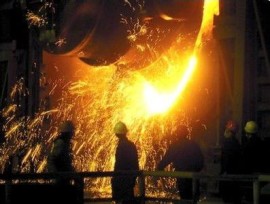
The BBS Chicago newspaper on December 29, the article, the original problem: Beijing began to say goodbye to the “made in China” For China, a large state-owned steel mills, the domestic economic slowdown, increasingly fierce competition, and the smoke of their factory is widespread. Over the past 30 years of profitable business model gradually ineffective. So what to do?
Surprisingly, a popular choice is to say goodbye to China. In November, hebei iron and steel group, announced that it would put 5 million tons of steel production capacity – accounts for about 11% of its annual output – moved to South Africa. To the overseas enterprise not only this one. According to the report, hebei, China’s most polluted provinces – plans by 2023 2023 tons, 30 million tons of cement and steel 30 million tons weight box glass production output.
At first glance, this seems to be no too big business sense. Bloomberg said the group’s steel mills in South Africa will produce “is equivalent to two-thirds of steel production last year in South Africa, Africa Liu Gang yield a third of the products (“. At the moment it is unclear whether these place on how much Chinese steel demand. In that case, why do it? In charge of the company in hebei officials may have no choice. First of all, they certainly are facing political pressure to reduce environmental impact to China. Second, I don’t know how to the expansion of the cut is too industry in hebei. Now China building industry obviously have too much and too little capacity requirement.
So, in the domestic market demand is not strong, too much steel flow to where? First 11 months of 2014, China exported 2014 tons of iron and steel (almost 2013 steel production in the United States), than the same period last year increased by 47%. But exports is not a long-term solution, particularly the importer of anti-dumping.
To seek long-term growth of Chinese enterprises, the only choice is to go global. Beijing since the 1990 s to encourage domestic enterprises to overseas. But the strategy of “going out” to long-term before, now is nothing urgent.
China recently announced that it will further promote the SBC “going out”, including providing financial assistance. The goal there are two. A, Beijing is eager to see China become internationally competitive, thus may encourage even overseas. Second, this is a signal that China wants to produce better returns its massive foreign exchange reserves, in both profit and political influence.
Going to work? In the short term, hebei iron and steel group of investment is certainly not the insurance. But as long as the investment environment of China cannot build enterprise want to, this is probably the best way, other Chinese firms may soon to follow.








